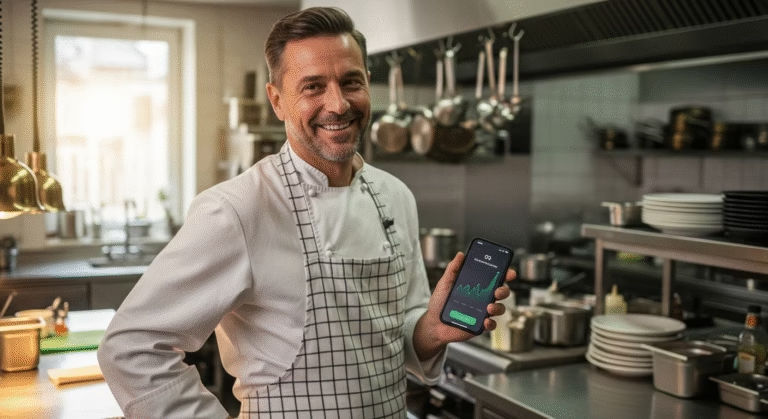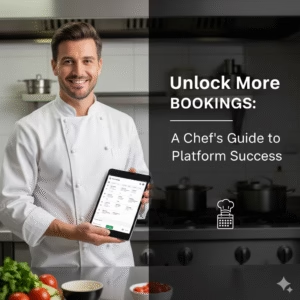Imagine this.
It’s a Saturday morning in Lagos. You’re curled up in bed, no alarms, no stress, no customers calling repeatedly to say “The rider isn’t here oo”. You’re still half-asleep, but your phone keeps buzzing. Not because someone is owing you and is finally paying back (we thank God for those ones), but because without lifting a finger, you just made money.
That, my friend, is the beauty of passive income.
Now, I know what you might be thinking:
“Passive income? Abeg, is that not for tech bros, landlords, and YouTubers?”
Nope. It’s for you too, the chef, caterer, baker and foodpreneur.
In this article, I’ll show you what passive income really means, why it’s perfect for chefs in Nigeria (and beyond), and seven powerful ways you can start making money while you sleep — with real examples where you can turn your skills into an evergreen money-maker.
So, let’s roll.
What exactly is Passive Income?
Passive income is money you earn without actively working for it. Think of it like planting a mango tree you put in effort at the start, watering and nurturing it, but once it grows, you can keep enjoying the fruits for years. For chefs, it means finding ways to package your skills, recipes, and creativity into products or services that keep earning even when you’re not in the kitchen.
Now, I’m not here to sell you any kind of fairy tales or unrealistic dreams. Passive income is absolutely not about “doing nothing and getting rich overnight.” You need to put in a significant amount of hard work initially, whether that means creating the product or service, setting everything up properly, or investing your valuable time and money. However, once you have everything up and running smoothly, you can then step back and allow it to work for you with much less ongoing effort.
Why Chefs in Nigeria Need Passive Income
Let’s be real. The food business in Nigeria is rewarding, but it’s also unpredictable. One week, you’re booked out; the next week, customers are ghosting you because “things are tight.” Add rising food costs, NEPA wahala, and inflation, and it’s clear why relying only on daily cooking is risky.
Passive income helps you:
- Earn even when you’re not physically cooking.
- Create a financial cushion for slow months.
- Expand your reach beyond your physical location.
- Build long-term wealth while still doing what you love.
7 Ways Chefs Can Make Money Passively
1. Sell an Online Cooking Course
This is the most common way a lot of chefs are leaving money on the table. You have recipes, tips, and kitchen hacks people would pay for so why keep them in your head? You always think that it is common and people don’t really need it but the honest truth is that there are thousands who need that skill, knowledge, recipe or even styling technique you think is common. Fun fact is that they are willing to pay millions for it.
Create and sell an online course teaching a specific cooking skill or knowledge:
- How to make smoky Nigerian jollof rice
- Cake decoration for beginners
- Street food recipes for small chops business
- Meal prep for busy 9-5 Nigerians
Once recorded and uploaded on the right platform, your course can keep selling for months or years. All you would need to do is update it to ensure it stays fresh and current.
Real Example: A chef in Port Harcourt created a “Party Jollof Masterclass” for ₦8,000. She filmed it once, uploaded it online, and now sells an average of 15 courses a month without teaching live again.
Chef4Me Plug: The Chef4Me Learning Hub is the easiest way to start. You upload your course once, and thousands of potential students (in Nigeria and beyond) can find it and buy. Chef4Me handles the tech side, you just focus on creating value.
2. Write and Sell a Digital Cookbook
You’ve been giving out recipes for free on WhatsApp. The ever generous cooking stream that never runs dry. Everyone that drinks smiles happily with a “thank you so much” and off they go. They profit from it and some even go as far as selling it. Why not compile them into a beautiful eBook and sell it too? A digital cookbook doesn’t require printing costs. You design it by yourself(using Canva- there are a lot of free beautiful templates you can use) or pay a designer, then sell it repeatedly online.
Real Example: Chef Tunde in Abuja put together a ₦5,000 “Nigerian Home Cooking eBook” with 30 recipes. He sold 200 copies in his first year — that’s ₦1,000,000 in revenue from something he made once.
You can sell via:
- Instagram bio link
- WhatsApp Business catalog
- Chef4Me Learning Hub (yes, it’s not just for video courses!)
3. Create a YouTube Channel for Ad Revenue
If you love teaching and don’t mind being in front of a camera, YouTube can be a goldmine. You film your cooking process, tips, and behind-the-scenes, upload consistently, and once you hit YouTube’s monetization criteria (1,000 subscribers + 4,000 watch hours), ads start paying you.
Real Example: Sisi Yemmie, a Nigerian food YouTuber, has videos with millions of views. That’s ad money, brand deals, and cookbook sales all from content that stays online 24/7.
4. License Your Recipes to Restaurants or Food Brands
This particular approach is quite uncommon in Nigeria, but it has proven to be effective. If you develop a unique recipe, for example, a distinctive signature suya spice mix or an innovative dessert, you have the opportunity to license it to various restaurants or brands. These establishments will pay you a fee for the rights to use your recipe, while you retain full ownership of the original creation. This method allows you to earn income without losing control over your special recipe.
Real Example: A chef in South Africa created a unique peri-peri sauce recipe and licensed it to a fast-food chain for a yearly fee.
In Nigeria, think bottled pepper sauce, spice blends, or marinades — the restaurant uses your product, pays you, and you don’t have to cook every plate.
5. Sell Pre-Packaged Food Products
The most common way that chefs earn their income is by preparing and selling premade or on-demand cooked meals directly to customers. However, instead of focusing solely on selling freshly cooked meals every day, you could consider packaging and selling products that have a much longer shelf life. This approach allows you to reach a broader market and reduce the pressure of daily cooking. Some examples of such products include:
- Homemade chin chin
- Bottled zobo
- Dried fish
- Frozen puff-puff dough
Once you set up distribution (supermarkets, online stores, or resellers), orders can keep flowing without you having to make each sale in person.
6. Affiliate Marketing for Kitchen Tools or Food Brands
Affiliate marketing refers to the practice of promoting another company’s or individual’s product or service and earning a commission for every sale or lead generated through your unique referral link. This method allows you to earn passive income by recommending products you believe in, without having to create or manage the products yourself.
If you have a social media audience, you can recommend kitchen equipment, cookware, or even food ingredients. Many Nigerian e-commerce stores (like Jumia) have affiliate programs.
Real Example: A Lagos baker partnered with a baking supply store — every time someone bought through her link, she got 5% commission. Last December alone, she made ₦80,000 without selling a single cake.
7. Host Paid Recipe Memberships
Think of it as a Netflix-style subscription service, but specifically designed for your unique collection of recipes. Subscribers pay a monthly or annual fee that grants them exclusive access to your carefully curated recipes, expert cooking tips, and perhaps even entry into a private community or group where they can interact directly with you, asking questions and receiving personalized advice. This setup creates a valuable, ongoing connection between you and your audience, offering them a rich, immersive culinary experience.
Real Example: A Nigerian chef created a Telegram group where members pay ₦2,000 monthly for weekly recipes and kitchen hacks. With 150 members, that’s ₦300,000 every month — and the chef only uploads content once a week.
Chef4Me Plug: You can structure this inside the Chef4Me Learning Hub by adding new mini-courses or recipe videos monthly. Members keep paying, you keep uploading, and the income stays steady.
Quick Recap: The 7 Passive Income Ideas for Chefs
- Sell an online cooking course (Chef4Me Learning Hub makes this easy).
- Write and sell a digital cookbook.
- Create a YouTube channel for ad revenue.
- License your recipes to restaurants or food brands.
- Sell pre-packaged food products.
- Affiliate marketing for kitchen tools or food brands.
- Host paid recipe memberships.
How to Start — Without Overthinking
Passive income for chefs is not very common in this part of the world because most people focus on earning actively. You might have even read this list and thought: “This is nice, but I don’t have time.”
The truth is, you don’t need to start everything at once. Pick one method, commit to it for 3-6 months, and build from there.
If you’re not tech-savvy, start with the easiest creating a course or eBook on the Chef4Me Learning Hub. The platform is built for chefs, so you don’t have to worry about setting up a website or payment system.
And remember: passive income is like planting seeds. Some will grow fast, others slow. The key is to start planting now.








